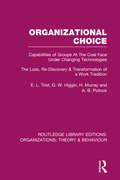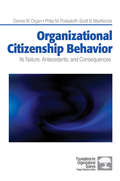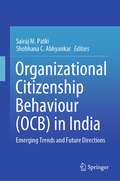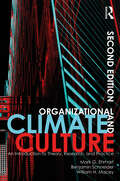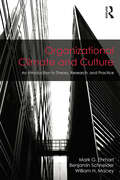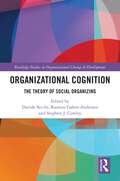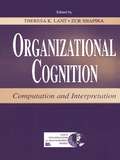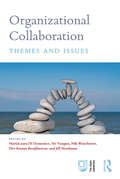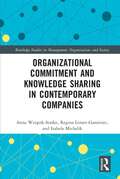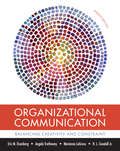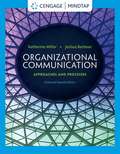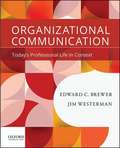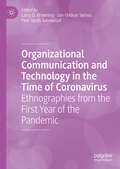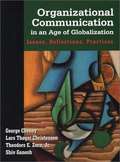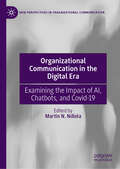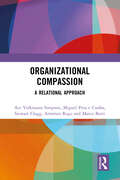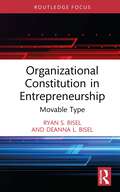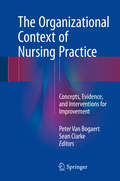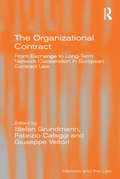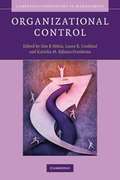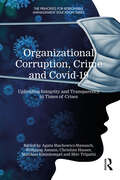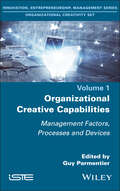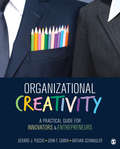- Table View
- List View
Organizational Choice: Capabilities of Groups at the Coal Face Under Changing Technologies (Routledge Library Editions: Organizations)
by E. L. Trist G. W. Higgin H. Murray A. B. PollockThis book develops and applies a new approach to the study of the working group and indeed of productive enterprises more generally. Unlike similar studies, in this volume the human is related back to the technological, and it is the socio-technical system as a whole that is the object of study. The work reported in this book shows how alternative modes of work organization can exist for the same technology, giving the possibility of organizational choice.
Organizational Citizenship Behavior: Its Nature, Antecedents, and Consequences
by Dennis W. Organ Philip M. Podsakoff Scott Bradley MacKenzieOrganizational Citizenship Behavior: Its Nature, Antecedents, and Consequences examines the vast amount of work that has been done on organizational citizenship behavior (OCB) in recent years as it has increasingly evoked interest among researchers in organizational psychology. No doubt some of this interest can be attributed to the long-held intuitive sense that job satisfaction matters. Authors Dennis W. Organ, Philip M. Podsakoff, and Scott B. MacKenzie offer conceptual insight as they build upon the various works that have been done on the subject and seek to update the record about OCB.
Organizational Citizenship Behaviour (OCB) in India: Emerging Trends and Future Directions
by Sairaj M. Patki Shobhana C. AbhyankarThis book presents an exploration of Organizational Citizenship Behaviour (OCB), a concept with a long-standing history. It offers contemporary studies and discusses possible future directions for workplaces. The diverse range of topics this book covers makes it an engaging resource for anyone interested in OCB. The section on the pandemic covers citizenship acts performed by Indian organizations, OCB among teachers, and its significant work-related correlates in post-pandemic India. The second section covers contemporary correlates of OCB, such as work-life balance, compliance, counter-productive workplace behaviours (CWBs), and employee expectations. The future workplaces section discusses challenges to OCB, the measurement of OCB in evolving work environments, the role of machine learning (ML) in recruitment, and the importance of diversity management in ensuring OCB in inclusive workplaces. The book makes a valuable source of relevant issues on OCB while providing a broader perspective on future possibilities. It serves as reference material for students and researchers in fields like organizational behaviour, human resource management and development, and industrial psychology to study contemporary issues in OCB. The book also serves as a handy guide for managers looking to harness the benefits of citizenship behaviours to give their organizations an edge over competitors in the near future.
Organizational Climate and Culture: An Introduction to Theory, Research, and Practice
by null Mark G. Ehrhart null Benjamin Schneider null William H. MaceyOrganizational Climate and Culture breaks down the barriers between the fields of organizational climate and organizational culture to encourage a broader understanding of how an organization’s environment affects its functioning and performance.Building on in-depth reviews of the development of both the organizational climate and organizational culture literatures, the book identifies key research issues as well as how practitioners can utilize the key concepts when conducting organizational cultural inquiries and leading change efforts. The book identifies the key strengths and limitations of research and theory on each topic and then presents ways each field could learn from the other. The authors also identify how practitioners can leverage the key concepts in the two literatures when conducting organizational cultural inquiries leading to climate and culture change efforts. The end product is an in-depth discussion and reconciliation of organizational climate and culture unlike anything that has come before it.In this updated edition, Mark G. Ehrhart, Benjamin Schneider and William H. Macey present a thorough examination of both the history and current status of research in each field, as well as areas for their potential integration. Academics, practitioners, and students will all deepen their understanding of how organizations function and will gain insights into how to improve both organizational research and organizational effectiveness.
Organizational Climate and Culture: An Introduction to Theory, Research, and Practice (Organization and Management Series)
by William H. Macey Benjamin Schneider Mark G. EhrhartThe fields of organizational climate and organizational culture have co-existed for several decades with very little integration between the two. In Organizational Climate and Culture: An Introduction to Theory, Research, and Practice, Mark G. Ehrhart, Benjamin Schneider, and William H. Macey break down the barriers between these fields to encourage a broader understanding of how an organization’s environment affects its functioning and performance. Building on in-depth reviews of the development of both the organizational climate and organizational culture literatures, the authors identify the key issues that researchers in each field could learn from the other and provide recommendations for the integration of the two. They also identify how practitioners can utilize the key concepts in the two literatures when conducting organizational cultural inquiries and leading change efforts. The end product is an in-depth discussion of organizational climate and culture unlike anything that has come before that provides unique insights for a broad audience of academics, practitioners, and students.
Organizational Cognition: The Theory of Social Organizing (Routledge Studies in Organizational Change & Development)
by Davide SecchiCognition is usually associated with brain activity. Undoubtedly, some brain activity is necessary for it to function. However, the last thirty years have revolutionized the way we intend and think about cognition. These developments allow us to think of cognition as distributed in the sense that it needs tools, artifacts, objects, and other external entities to allow the brain to operate properly. Organizational Cognition: The Theory of Social Organizing takes this perspective and applies it to the organization by introducing a model that defines the elements that allow cognition to work. This model shows that cognition needs the combined and simultaneous presence of micro aspects—i.e. the biological individual—and macro super-structural elements—e.g. organizational climate, culture, norms, values, rules. These two become practice of cognition as they materialize in a meso domain—this is any action that allows individuals to perform their daily duties. Due to the micro-meso-macro interactions, this has been called the 3M Model. Most of what happens in the meso domain relates to exchanges between two or more people, i.e. it is a social activity. This is usually mentioned in the perspectives above, but it is rarely explored. By bringing meso activities to the center of cognition, the book develops and presents the Theory of Social Organizing. Not only this is useful to organizational scholars, but it also opens a new path for cognition research.
Organizational Cognition: Computation and Interpretation (Organization and Management Series)
by Theresa K. Lant Zur ShapiraOrganizational Cognition is a collection of chapters written by scholars from around the world. The editors outline the history of two approaches to the study of cognition in organizations, the computational approach and the interpretive approach. The chapters represent some of the most cutting-edge research on organizational cognition, covering research that spans many levels of analysis. Much of the work in the book demonstrates how computational and interpretive approaches can be combined in a way that provides greater insight into cognitive processes in and among organizations. The editors conclude by elaborating the likely boundary conditions of each approach and how they can be combined for a more complete understanding of cognition in organizations.
Organizational Collaboration: Themes and Issues
by MariaLaura Di Domenico, Siv Vangen, Nik Winchester, Dev Kumar Boojihawon and Jill MordauntMany organizations today operate across boundaries - both internal and external to the organization. Exploring concepts and theories about different organizational, inter-organizational and international contexts, this student reader aids understanding of the individual’s experience of working within and across such boundaries. The book adopts a critical approach to individual experience and highlights the complexities inherent in these different layers and levels of organizing. Comprising a collection of key articles and extracts presented in a readable accessible way, this book also features an introductory chapter which provides an overall critique of the book. Each part features a brief introduction before analyzing the following key themes: managing aims power and politics cultural diversity international management perspectives the darker side of collaborative arrangements Some of the readings will specifically address collaboration ‘head on’ whilst others will provide an important context or highlight significant theoretical and practical issues that are considered relevant and interesting within the framework of the themes presented. As such, this book differs from existing titles as it sits bestride collaboration and organizational behaviour / theory in order to inform learning of exchange relationships on inter-personal, intra-organizational, and inter-organizational levels. The articles included are selected as critical in approach, straddling and addressing the central contexts described above, and highlighting the experience-centred nature of learning that can be derived from the content presented. This comprehensive reference will be useful supplementary reading for organizational behaviour courses as well as core reading for those students undertaking research on collaboration.
Organizational Commitment and Knowledge Sharing in Contemporary Companies (Routledge Studies in Management, Organizations and Society)
by Anna Wziątek-Staśko Regina Lenart-Gansiniec Izabela MichalikWhen evaluating the success of an organization, the value of employees’ organizational commitment and the process of knowledge sharing among staff must be considered. As illustrated in this volume, these two concepts are key conditions for organizational success in the contemporary world. This book explores the concept of organizational commitment, what it is, and how to use and understand the value in knowledge management and sharing for both employees and organizations as a whole. A profound analysis of the global literature exposes organizational commitment and knowledge sharing as key determinants of the effectiveness of the organization management process, including human capital management. While much space in the literature on the subject is devoted to the exploration of the above-mentioned concepts, treated as categories subject to separate analysis, the diagnosis and analysis of the relationship between them should be treated as a poorly recognized process. This book fills a research gap, providing a theoretical foundation and important information on organizational commitment and knowledge sharing, highlighting the relationship between both research categories. It will be of interest to researchers, academics, practitioners, and students in the fields of human resource management, leadership, and organizational studies.
Organizational Communication: Balancing Creativity and Constraint
by Eric M. Eisenberg Angela Trethewey Marianne Legreco H. L. Goodall Jr.Organizational Communication covers the core theories and skills that organizational communication students need, sharing the very best of current scholarship, particularly as it relates to rapidly evolving topics like diversity, economics, and technology. Throughout, the book asks students to put what they're learning into practice, always considering both the enabling and constraining aspects of communication. Striking this balance between creativity and constraint helps people achieve their professional and personal goals. Perhaps the most notable addition to the new edition is a new co-author. Marianne LeGreco, from the University of North Carolina at Greensboro. LaGreco is an Associate Professor in their Department of Communication Studies. Her expertise in organizational policy, community organizing, and the intersections of health and organizing add a new and exciting dimension to the text.
Organizational Communication: Approaches And Processes (Mindtap Course List Series)
by Katherine Miller Joshua BarbourMiller's text presents organizational communication from both a communication and managerial perspective. Her writing style and consistent use of examples and case studies results in a text that undergraduates students will find easy to understand.
Organizational Communication: Foundations, Challenges, and Misunderstandings (3rd edition)
by Daniel P. Modaff Sue Dewine Jennifer A. ButlerA clearly articulated treatment of organizational communication, Organizational Communication utilizes interviews to explore communication and misunderstandings at all levels of the organization. This book offers a unique perspective on the field of internal organizational communication. The authors review the foundational material, but intersperse the discussions with excerpts from interviews conducted with more than 160 leaders and workers in a variety of organizations. Unlike other books in this field, Organizational Communication explores organizational communication from the perspective of all organizational members, not just management.
Organizational Communication: Today's Professional Life in Context
by Jim Westerman Edward BrewerFilled with both classic and contemporary examples and a variety of engaging stories, Organizational Communication teaches students how to apply theory in diverse real-world contexts including government, small and family-run businesses, nonprofit organizations, and entrepreneurial ventures. This book presents the increasingly global and mediated nature of communication in organizations, resulting in a highly readable and engaging introduction to the field.
Organizational Communication and Technology in the Time of Coronavirus: Ethnographies from the First Year of the Pandemic
by Larry D. Browning Jan-Oddvar Sørnes Peer Jacob SvenkerudThe pandemic has created a crisis that has no equivalent in recent history, leading to a wide range of disruption across various social strata, highlighting and reinforcing inequality, and leading to profound organizational shifts. In this book, organizational communication scholars grapple with the implications of the pandemic for work and organizations, examining the immediate impact on their personal lives in an ethnographic narrative, but also theorising what the long term implications of COVID-19 will be. The book also explores the devastating impact of the virus on healthcare workers, on BIPOC entrepreneurs, and on people in developing economies. A timely, innovative work, this book will appeal to academics studying organizational communication, organizational responses to crisis, ethnographies, and alternative research methods.
Organizational Communication in an age of Globalization: Issues, Reflections, Practices
by George Cheney Lars Thogher Christian Theodore E. Zorn Shiv GaneshOrganizational communication as an area of study has enjoyed rapid expansion in recent years: in many departments.
Organizational Communication in the Digital Era: Examining the Impact of AI, Chatbots, and Covid-19 (New Perspectives in Organizational Communication)
by Martin N. NdlelaThis edited collection examines different facets of organizational communication in the context of current technological developments and disruptions brought about by the COVID-19 pandemic. AI is making inroads in organizational communication practice, influencing how organizations communicate and interact with their environments. It drives, augments and supplements organizational communication. Chatbots, for example, are becoming increasingly relied upon by organizations, using them to manage basic communication tasks that used to belong solidly to the realm of human. Similarly, developments such as ChatGPT have attracted scholarly attention due to their perceived implications on various aspects of communication. All of this has a profound effect on human interactions and relationships in organizational settings. Filling a gap in scholarship around organizational communication in light of ongoing digital transformation processes and COVID-19 induced transformations, chapters provide an up-to-date account of how new communication technologies, especially AI, are transforming organizational communication. The contributions reflect upon the most current theory and practice in the field in the post-COVID era. Combining theory, applied scholarship and fresh case studies, this is a valuable resource that reflects on the new realities of today’s organizational environment.
Organizational Compassion: A Relational Approach
by Ace Volkmann Simpson Miguel Pina Cunha Stewart Clegg Arménio Rego Marco BertiOrganizational compassion provides a multitude of benefits at individual, team and organizational levels. These encompass heightened positive affect, trust, engagement, loyalty, performance, resilience, and recovery. This important book provides an accessible yet scholarly overview of key academic findings and theories on organizational compassion. It equips readers with tools for reflection, awakening and practical application of compassion within the workplace across dyadic, team and organizational contexts. Historically, compassion work has been largely unacknowledged in official organizational discourse. Yet, wherever there are human beings, there will be suffering; where there is human suffering, one can often find human responses infused with kindness and compassion. This observation holds true across industries, professions, and communities. The book explores the complexities of organizational compassion, analyzing the factors that enhance organizational compassion capabilities, as well as those that make compassion falter and fail. The primary aim of this book is to foster the cultivation of organizational compassion by providing a provocative, stimulating and engaging foray into the academic study of organizational compassion for readers, ranging from undergraduate to postgraduate and executive students, as well as reflective practitioners. In a world marked by suffering and challenges, a research-based understanding and fostering of compassion at work, offers a path towards a better future.
Organizational Constitution in Entrepreneurship: Movable Type (Routledge Studies in Communication, Organization, and Organizing)
by Ryan S. Bisel Deanna L. BiselThis book presents the seven entrepreneurial activities (SEA) model of new organizational constitution, a prescriptive extension of the four flows model tradition of communicative constitution of organizations (CCO) theory. Organizational Constitution in Entrepreneurship explains the SEA model in detail, illustrating it with autobiographical accounts from Deanna Bisel’s years of experience as an entrepreneur. The volume explores how entrepreneurial efforts to create and maintain organizations involve interrelated activities. In doing so, it offers a vision of new organizational creation and maintenance as (a) communicative and material, (b) initiated by value propositions, (c) difficult to achieve, (d) having periods of partiality, (e) being the result of constitutive leadership distributed among members, and (f) dependent upon constitutive momentum generated in organizational learning. This unique volume will be a key reference for students and scholars of organizational communication, management, business studies, entrepreneurship, and communication studies.
The Organizational Context of Nursing Practice
by Peter Van Bogaert Sean ClarkeThis book explores the various features of work environments that affect nurses' experiences of their work, their interactions with co-workers and patients, and ultimately health care quality and patient outcomes. Using a broad and comprehensive approach, the authors identify the most extensively researched and best-understood concepts in the field and presents a critical and up-to-date review of the evidence regarding causes and effects of work environment features. It then presents evidence regarding organizational interventions aimed at broad ranges of clinical practices and outcomes, such as team-based interventions and management practices to improve practice climate. The ideas, approaches, and evidence are presented by a team of researchers and experienced practitioner/leaders; taken together, they form a state-of-the-science toolkit. Unique features of this book include a systematic presentation of best practices in nursing and healthcare leadership, along with the conceptual grounding and empirical support for these approaches, and extensive demonstrations of how these practices, many of which originated in North America, apply to European contexts.
The Organizational Contract: From Exchange to Long-Term Network Cooperation in European Contract Law (Markets And The Law Ser.)
by Stefan Grundmann Fabrizio CafaggiThis book introduces and develops the paradigm of the organisational contract in European contract law. Suggesting that a more radical distinction should be made between contracts which regulate single or spot exchanges and contracts that organize complex economic activities without creating a new legal entity, the book argues that this distinction goes beyond that between spot and relational contracts because it focuses on the organizational dimension of contracting and its governance features. Divided into six parts, the volume brings together a group of internationally renowned experts to examine the structure of long-term contractual cooperation; networks of contracts; knowledge exchange in long-term contractual cooperation; remedies and specific governance rules in long-term relationships; and the move towards legislation. The book will be of value to academics and researchers in the areas of private law, economic theory and sociology of law, and organizational theory. It will also be a useful resource for practitioners working in international contract law and international business transaction law.
Organizational Control
by Sim B Sitkin Laura B. Cardinal Katinka M. Bijlsma-FrankemaOrganization scholars have long acknowledged that control processes are integral to the way in which organizations function. While control theory research spans many decades and draws on several rich traditions, theoretical limitations have kept it from generating consistent and interpretable empirical findings and from reaching consensus concerning the nature of key relationships. This book reveals how we can overcome such problems by synthesising diverse, yet complementary, streams of control research into a theoretical framework and empirical tests that more fully describe how types of control mechanisms (e. g. , the use of rules, norms, direct supervision or monitoring) aimed at particular control targets (e. g. , input, behavior, output) are applied within particular types of control systems (i. e. , market, clan, bureaucracy, integrative). Written by a team of distinguished scholars, this book not only sheds light on the long-neglected phenomenon of organizational control, it also provides important directions for future research.
Organizational Corruption, Crime and Covid-19: Upholding Integrity and Transparency in Times of Crises (The Principles for Responsible Management Education Series)
by Agata Stachowicz-StanuschCorruption often flourishes in times of uncertainty and crisis. When institutions and oversight are weak, and public trust low, corruption can thrive and undermine how societies respond to the crisis. Covid-19 brought this issue into sharp focus, and this book uncovers some of the problems experienced across the globe and, crucially, explains how organizations and countries can strengthen their anti-corruption systems to prevent problems in the future.The book has been created by the members of the United Nations Principles for Responsible Management Education group on anti-corruption and brings together top international experts to consolidate the lessons from the Covid-19 crisis in order to improve transparency, integrity, trust, and governance in the future. Cybersecurity and cybercrime related to the pandemic are a particular focus. These factors are essential to social and economic order. Practice-oriented, each chapter offers examples of methods, approaches, tools, and cases which can be used for anti-corruption teaching, policy, and corporate initiatives.With insights and cases from right across the globe, the book will be of interest to NGOs, policymakers, organizational leaders, students, and researchers looking to foster accountability, integrity, and transparency across organizations in times of crisis.
Organizational Creative Capabilities: Management Factors, Processes and Devices
by Guy ParmentierCreativity, whether individual or collective, is often approached without taking into account organizational processes, routines and management systems. However, in today’s constantly changing world, developing creativity at all levels of an organization is the key to developing a continuous flow of innovation and solving complex problems in order to achieve set goals. Organizational Creative Capabilities presents a comprehensive approach to creativity, with a view towards building a genuine organizational capability with the potential to deliver strategic advantages. The book provides an understanding of organizational creative capabilities through methods of openness, slack, socialization, agility, equipment and idea management. It provides keys and examples for developing recurrent, value-creating creativity, and also addresses the question of measuring the performance of creative capabilities.
Organizational Creativity: A Practical Guide for Innovators & Entrepreneurs
by Gerard J. Puccio Nathan Schwagler John F. CabraReignite your creative-thinking skills to produce innovative solutions Organizational Creativity: A Practical Guide for Innovators and Entrepreneurs by Gerard J. Puccio, John F. Cabra, and Nathan Schwagler, is a compelling new text designed to transform the reader into a creative thinker and leader. Arguing that creativity is an essential skill that must be developed, the authors take a highly practical approach, providing strategies, tools, and cases to help readers hone their creative abilities. Whether students are preparing to become entrepreneurs or to work in an established firm, this text will help them survive and thrive in an era of innovation and change.
Organizational Creativity: A Practical Guide for Innovators & Entrepreneurs
by Gerard J. Puccio Nathan Schwagler John F. CabraReignite your creative-thinking skills to produce innovative solutions Organizational Creativity: A Practical Guide for Innovators and Entrepreneurs by Gerard J. Puccio, John F. Cabra, and Nathan Schwagler, is a compelling new text designed to transform the reader into a creative thinker and leader. Arguing that creativity is an essential skill that must be developed, the authors take a highly practical approach, providing strategies, tools, and cases to help readers hone their creative abilities. Whether students are preparing to become entrepreneurs or to work in an established firm, this text will help them survive and thrive in an era of innovation and change.
